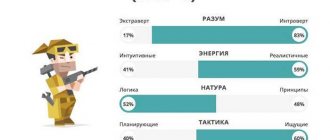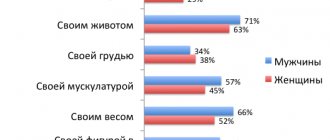Will and regulation of activity.
It is traditionally believed that the main thing for the emergence of volitional regulation is the presence of barriers, obstacles in achieving the goal.L. M. Wekker believes that volitional regulation begins where there is at least a two-level hierarchy of activity programs, where it is necessary to correlate the levels of these programs and select among them the level that meets the criteria of intellectual, emotional, moral and general social value.
I.M. Sechenov put approximately the same meaning into the concept of will when he wrote that will is the active side of the mind and moral feelings.
Volitional regulation includes the following components:
- cognitive
- emotional
- behavioral (active)
The structure of a volitional act includes the following components:
- motivation and awareness of the goal;
- struggle of motives;
- act of decision making;
- execution.
Volitional action is related to needs, but does not flow directly from them. It is mediated by the awareness of the incentives for action as motives and its results as goals (S. L. Rubinstein).
Will arises when a person is capable of reflecting his own drives and can somehow relate to them. The will is inextricably linked with the available plan of action. Through volitional action, a person plans to implement the goal facing him, subordinating his impulses to conscious control and changing the surrounding reality in accordance with his plan.
Basic characteristics of will. Volitional regulation of behavior. The concept of will is one of the most ancient; Aristotle tried to study it. Descartes. It was introduced as an explanatory concept. According to Aristotle, the concept of will was necessary to explain the generation of action based not on a person’s desires, but on a rational decision about his existence. Realizing that knowledge itself does not have motivation, but constantly faced with the reality of human ethical actions, when an action is carried out not because one wants to, but because it is necessary, Aristotle was forced to look for a force capable of initiating such behavior.
The problem of will, according to Aristotle, is the problem of giving the object of action a motivating force and thereby providing an incentive to action (or inhibiting, if necessary, reducing the motivating force of the object of action).
Previously, the will was considered as a supernatural force that took precedence over other mental processes. There is no absolute will. We can talk about will when an impulse arises:
- Volition phase: desire + desire + motive.
- Choice phase: struggle of motives, decision making.
- The phase of implementation by action, the decision turns into bodily action. Our decision and behavior is determined by a strong motive. In Aristotle's concept, the will determined not only the initiation of voluntary actions, but also their choice and their regulation during implementation. Moreover, the will itself could be understood both as an independent force (formation) of the soul, and as a person’s ability to perform a certain activity, coming from himself.
Thus, the first paradigm within which the problem of will was posed was the generation of human action coming from himself. Consideration of the will in the context of generating action presupposes, first of all, the incentive function of the will, and such an approach can be conventionally designated as motivational; it is the most powerful in the study of will.
It is characterized by the fact that will is analyzed as the ability to initiate actions, or to strengthen the impulse to action when it is deficient, due to external or internal obstacles, the absence of an actually experienced desire for action, the presence of motives competing with the action being performed. Depending on the ideas about the mechanisms of such ability, will is understood:
- or as an independent mental formation,
- or as an independent force of non-psychological nature,
- either as a motivational or emotional formation (desire, affects, needs),
- or comes down to the state of the brain as a regulatory mechanism.
Later, a second approach to the study of will was formulated, the “Free Choice” approach. Within this approach, the will is endowed with the function of choosing motives, goals and actions. One of the trends in the development of this approach is the transfer of research on choice and, more broadly, decision-making into areas of research that are not directly related to the problem of will and have their own conceptual apparatus. Therefore, the urgent tasks of the “free choice” approach are to isolate the volitional aspects of the problem of choice and develop adequate methods for their experimental research.
Within the framework of this approach, two variants of ideas about will can be distinguished:
- Will is considered as an independent force (voluntaristic type of theory);
- Will is reduced to the functioning of cognitive processes (intellectualistic theories).
Thus, in modern psychology, the problem of will is presented in two ways: as a problem of self-determination (motivational approach and the “free choice” approach) and as a problem of self-regulation (regulatory approach).
When a person voluntarily accepts moral norms, the highest moral law and is guided by it in his actions, we can say that the person is morally free. To be free means to obey reason, not passions (Leibniz, Spinoza).
In psychology, freedom of choice is understood when a person, as a result of a struggle of motives, chooses the one that is stronger. Modern researchers of will are Selivanova, Ivannikov, Platonov. Will is defined by them as a person’s conscious regulation of his behavior as a result of overcoming internal and external obstacles to the path and goal. Structure of the will: Purpose; Level of aspiration; Volitional effort; The struggle of motives; Decision-making; Performance.
Volitional effort can occur at any stage of volitional action associated with overcoming obstacles. Volitional effort is a form of emotional stress that mobilizes all a person’s internal resources, creating additional motives for action and experienced mental states of significant stress (Ivannikov). The psychological mechanism of volitional effort is the attraction of a new motive, thereby changing the meaning of the action in order to strengthen the primary impulse.
Function of volitional behavior
What function does volitional behavior perform?
The activity of an individual is always aimed at achieving certain results .
In this case, motivation can be both conscious and unconscious.
In the first case, we are talking about purposeful activity , during which a person is guided by logic and common sense. In the second case, the activity is also purposeful, but it is carried out under the influence of unconscious motives (emotions).
The main function of volitional behavior is the achievement by a person of a consciously set goal.
In each case, a certain sequence of steps is developed, the observance of which allows one to achieve the most effective result in the proposed circumstances. All decisions and actions are analyzed.
Volitional behavior is a manifestation of an individual approach to one’s own person.
At such moments, a person views himself not as a member of society, but as an independent active unit bearing responsibility for the decisions made.
Such actions are always focused on the future , since they allow us to determine the path of further development. A person stops assessing his actual state at the current moment in time and begins to think about the future.
Mechanisms
A simple action includes 4 components: sensory, central (mental), motor, control and corrective.
At the sensory level, a person perceives the proposed circumstances. At the central level, the existing problem is understood.
The motor component stimulates the performance of active actions aimed at achieving a decision made at the mental level. At the control , the completed action is assessed.
If doubts arise about the positive outcome of the situation, behavior is corrected.
A complex action has an extensive structure. Mechanism of complex volitional regulation:
- Awareness of the current need. This may be a feeling of need for certain people (communication), living conditions, material goods, specific objects, social factors, etc. The list of current desires is unlimited. Throughout life, new needs constantly appear. Often, the satisfaction of some of them leads to the automatic emergence of new aspirations arising from changed circumstances. For example, a person dreams of a car. Having bought a car, he begins to dream of a garage, etc. Until the individual satisfies his current desire, he experiences a state of discomfort. Moreover, the level of discomfort depends on the degree of significance of the desire for him. That is, a person selectively perceives the surrounding reality. Having access to various benefits, he may feel discomfort only because of the inaccessibility of the benefit that he himself considers necessary.
- Assessment of existing opportunities to meet existing current needs. As a result of choosing one of the possibilities, a goal is formed.
The goal acts as a system-forming component. It is she who forms the entire subsequent system of actions, motives and means.All global goals that a person sets for himself determine the meaning of his life. The current goals that we constantly set for ourselves throughout life determine the paths of our development. Without goals, a person would not see the meaning in his existence.
- The struggle of motives. In difficult life situations, there is a clash of various motives that are contradictory in nature. Such a collision can be short-term or protracted. If the situation is resolved quickly enough, then the person gets out of it with minimal loss of time and effort. If the struggle of motives drags on, a person is faced with the agony of choice. It takes a lot of time and nervous energy. Usually, the struggle between two desires of different value is short-term in nature. In this case, the more important desire quickly takes over. If desires are equivalent, it is extremely difficult for a person to choose between them.
- Decision-making. In such a situation of uncertainty, ultimately a final decision is still made, which determines the further activities of the subject. By its nature, such a decision can be impulsive, balanced, risky, cautious, inert. Each person chooses the type of decision depending on the level of development of his intellect and character traits.
Intellectually developed people with strong attitudes in life usually make balanced decisions.In extreme situations, they objectively assess the degree of risk and choose the most optimal option. Emotionally excitable individuals usually commit impulsive, risky actions. Doubting individuals prefer inert, cautious decisions.
- Implementation of activities. Specific tasks of the activity are determined, ways and means of its implementation are planned in detail. Since any action is carried out under certain conditions, a person always starts from the proposed circumstances. If circumstances change while moving towards your goal, there is a need to adjust the chosen methods and methods of solving the problem.
- Getting the result. The expediency of the actions taken is determined by the final result. It must be fully correlated with the initially set goal that the individual was striving for. At the same time, it is assessed how well it satisfies the initially existing need and meets the motives of the activity.
If the desire that initially underlay the individual’s activity is completely satisfied by the end of the act of volitional behavior, we can speak of successful completion of the task.If, despite achieving the formal goal, the original motive is not satisfied, there is a need to make new efforts to achieve the most satisfactory result.
According to Ivannikov
V.A. Ivannikov proposed his interpretation of the mechanisms of regulation of volitional behavior.
In his opinion, the goal is initially formed under the influence of external circumstances .
That is, there is a need to perform some action regardless of whether the individual has a corresponding desire.
Then, in consciousness, the proposed necessary action is given additional meaning in accordance with the individual’s existing system of values, attitudes and desires.
Ivannikov was of the opinion that the ease of creating additional meaning in an action directly depends on the level of moral development of the individual.
A person with a high level of moral attitudes always demonstrates a high level of volitional abilities that help him give meaning to any action.
The scientist identified the following psychological mechanisms of volitional regulation :
- reassessment of motive;
- change in the role of the individual;
- emotional experience caused by the expectation of a result;
- turning to rituals and traditions;
- creating a connection between the proposed action and more significant motives;
- stimulating one’s activity using imagination (for example, imagining oneself as a participant in a competition).
What actions are inherent?
Volitional regulation is characterized by conscious and purposeful actions taken by the decision of the individual himself. Performing these actions allows you to solve existing problems or achieve the desired result.
It is customary to distinguish between simple and complex actions. A simple action is an almost automatic act when an explicit motive leads to the execution of a task and the achievement of a result.
Such actions do not imply the application of significant volitional efforts and are equated to skills . For example, while crossing the road, a person sees a car approaching at high speed and takes a step back.
Here the motive is the desire to move to a safe distance, and the action is expressed in taking a step back. The result is allowing a moving car to pass and eliminating unpleasant consequences.
A complex action requires greater volitional efforts. It consists of a number of stages:
- awareness of the goal;
- the emergence of a desire to achieve it;
- opportunity analysis;
- assessment of motives (both stimulating to achieve the goal and those opposing it);
- struggle of motives;
- decision-making;
- the beginning of activities aimed at implementing the decision;
- overcoming emerging obstacles;
- getting the result.






